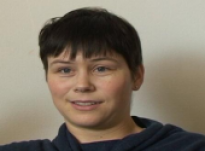Marine ' Interview 38

More about me...
Just before she was 30, Marine stopped the pill and she and her partner (Oliver Interview 40) started to try and get pregnant. They tried for a couple of years before getting married, but nothing happened. Shortly after the wedding Marine did conceive but it was an ectopic pregnancy. Doctors told her to try for another year after the surgery, but again nothing happened. They visited the GP who referred them to the local NHS hospital and they started to pursue treatment privately. Marine was referred for IUI while waiting for their IVF referral, but never did IUI after doctors found that she lacked a working fallopian tube. A scan showed she had polyps in the womb that needed to be removed before she could start treatment. During her first IVF cycle she hyperstimulated on the drugs, and was not able to continue with the cycle. Marine then had two cycles on the NHS and funded two privately. They finally had a frozen embryo cycle, with embryos that had been frozen after she hyperstimulated. That treatment was successful and Marine and Oliver have a daughter. In the space of two years they had four embryo transfers and started three other IVF cycles.
Marine thought her GP was really good because she warned her that there would be lots of choices and that she could always decide to say no to further treatment.
Marine thought her GP was really good because she warned her that there would be lots of choices and that she could always decide to say no to further treatment.
Marine's GP was very good at referring her after her ectopic pregnancy.
Marine's GP was very good at referring her after her ectopic pregnancy.
And then a year afterwards, we went to a GP, she was great, she was like yes, okay no need to wait any longer now. She referred us and we went to the hospital for investigations. And that was, they were fantastic, the fertility nurses there were just great. So if anyone has a choice, definitely choose that. But it took so long to do that dye test on my tubes because the one person that could do it at the hospital was off sick. So that just, was dragged out.
Marine described how frightening it was to have an ectopic pregnancy which left her with only one fallopian tube. Her GP referred her for IVF treatment as soon as she could.
Marine described how frightening it was to have an ectopic pregnancy which left her with only one fallopian tube. Her GP referred her for IVF treatment as soon as she could.
Marine had started to come to terms with becoming a successful, childless career woman and was finding the transition to motherhood rather strange.
Marine had started to come to terms with becoming a successful, childless career woman and was finding the transition to motherhood rather strange.
Marine describes how frightening she found her pregnancy.
Marine describes how frightening she found her pregnancy.
Terrifying yes. Especially the first few weeks. I had a bit of bleeding and I was on quite, they continued the injections until twelve weeks because I was so, yes, because I tried so hard, and they were worried about losing it, and so I was on quite a lot of drugs and I was worried how those drugs would affect the baby and especially about hormones, because I think if there’s a lot of hormone problems in pregnancy, they think there’s a link to, to you know, gender related, but they don’t [Baby] know whether it’s a boy or girls, these kind of things and so yes, I was worried about that and I was worried about losing it. Yes. I counted every day until about week 29, 30 and then after that it started to go really quickly but it was up until then just every day I woke up, yes, it’s still there. So, terrifying.
Marine describes how she was always keen to go straight for adoption, but her husband had wanted to exhaust the fertility treatment route first.
Marine describes how she was always keen to go straight for adoption, but her husband had wanted to exhaust the fertility treatment route first.
Marine said her husband had been very positive and optimistic at the start of treatment. He found it more difficult the longer they went on, while she coped better.
Marine said her husband had been very positive and optimistic at the start of treatment. He found it more difficult the longer they went on, while she coped better.
I suppose this was towards, like after about a year and a half of it I started to, because [husband] was getting. I found it really hard in the beginning and then I got better and better at it, because then I thought okay I’m seeing the end of it now. Whereas [husband] was very hopeful in the beginning so he found it harder and harder, the more attempts, so yes.
I remember the last failed attempt, it was like ringing up, oh it didn’t work out, oh okay, so we hugged and cried a bit and then I was like, “Okay now I’m going to sing and dance.” And I just felt a spurt of energy and this relief in a way that at least I wasn’t just waiting any more. And I was really high [laughs]. Which is so bizarre and [husband] was really down and he found it even harder, because I was so up about. I wasn’t up about it, I just could not be depressed any more. I just had to get on with things. And so I remember going out and buying loads of sweets and sort of treating him as though he had a flu on the sofa with nice films. Yes. Yes [laughs].

